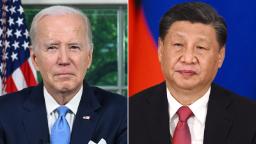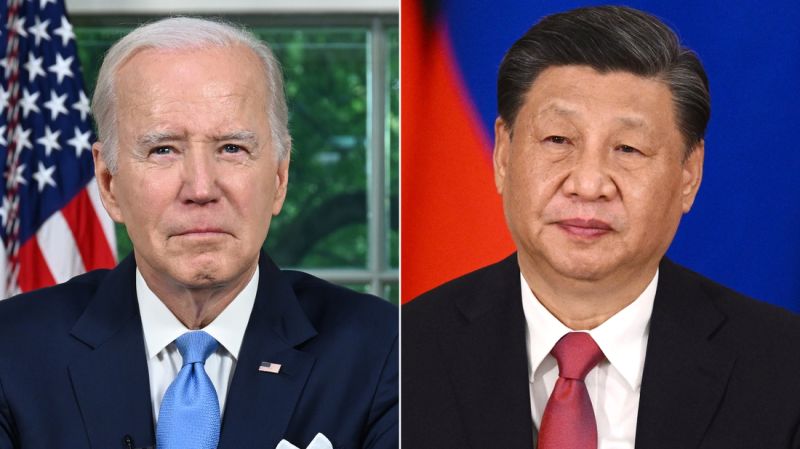
CNN
—
The Camp David invitation President Joe Biden extended to his Japanese and South Korean counterparts this week – the first summit held at the legendary presidential retreat since 2015 – was a significant show of camaraderie for two increasingly essential US allies.
Undergirding the talks is the three nations’ mutual concern over China, whose leader Xi Jinping Biden has sought to cultivate, despite a hardening view of the leader as an autocrat and adversary.
“This is a guy who I think I understand,” Biden told Democratic donors last week in Utah after describing Xi’s China as a “ticking time bomb.”
“We’re not looking for a fight with China,” he went on. “But we’re looking for a rational relationship to have with China.”
Work toward a “rational relationship” has been halting, despite Biden’s long ties with Xi. After months of acrimony, administration officials have recently begun visiting Beijing in a bid to reestablish regular communication. Yet tensions persist, and US-China ties remain deeply fraught.
Perhaps no other relationship in the world is quite as consequential than the one between Biden and Xi, who last spoke in person on the sidelines of the G20 summit in Bali last November in the hopes of establishing what US officials called a “floor” in the US-China relationship.
Biden told CNN’s Arlette Saenz on Friday he hopes to follow up on last year’s meeting with Xi “this fall.”
“I expect and hope to follow up on our conversation from Bali this fall – that’s my expectation,” Biden said.
The talks were watched closely in Tokyo and Seoul, where China’s military and economic aggressions are an ever-present reality and a motivator in mending a long-tarnished relationship. At Camp David on Friday, agreements on joint military and technology initiatives will be made against the looming backdrop of Beijing’s growing power.
“China is just fact on the ground, a huge player in Asia. You can’t dismiss it away,” explained a senior administration official. “You’re trying to shape the environment in ways that both advance our interests, secure our partners, and send a clear signal about what kind of actions we think would be provocative.”
As of Thursday evening, discussions were underway about how to describe China in the joint documents that are expected to come out of the summit, Japanese Foreign Ministry press secretary Hikariko Ono told a group of reporters.
It wasn’t so long ago that Xi was invited to his own high-profile summits hosted by an American leader. President Barack Obama hosted him at Sunnylands, the sprawling Palm Springs resort intended by its builder as the “Camp David of the West,” for lengthy talks in 2013. President Donald Trump served him chocolate cake at Mar-a-Lago.
Those types of engagements are difficult to imagine now, particularly amid growing tensions around Taiwan, a battle over emerging technology, human rights concerns and a leader Biden has deemed a “dictator.”
Even though Biden often recounts the hours of meetings he held with Xi as vice president, he has been challenged in new ways by his relationship with Xi as the two men have risen to the leader level.
“When they engaged last time neither of them had power,” the official said. “Xi has an enormous amount of power now. Biden senses that, understands it.”
Biden-Xi meetings are now treated as the “biggest possible gametime” for Biden, the official explained.
“The most intense, the most focus that I’ve ever seen President Biden is in advance of these engagements with President Xi,” the official said. “The President’s level of focus is off the charts. He wants intelligence briefings, he wants to bring his advisers together, he wants to hear different perspectives and he brings outsiders in.”
That preparation demonstrates just how consumed Biden and his entire administration are by what the official called “relentless” competition between the US and China.
Still, Biden’s hugely consequential personal relationship with Xi remains a work in progress.
Some officials say that Biden has struggled to develop the type of personal relationship with Xi that he deeply values in fellow world leaders who share democratic values. When Biden met with Prime Minister Narendra Modi of India at the White House in June, they bonded over shared frustrations with Xi, according to a second senior administration official.
Biden often speaks to his personal relationship with Xi publicly on the campaign trail, and he has continued to highlight the many hours they have spent together.
“I’ve spent more time with Xi Jinping than any world leader has,” Biden told donors at his fundraiser, recounting the hours they’d spent getting to know each other when each was their country’s number two.
At the same event, Biden offered a warning that reverberated throughout the region. Describing China’s weakening economy as a “ticking time bomb,” Biden said it could prompt China’s leaders to lash out.
“That’s not good because when bad folks have problems, they do bad things,” Biden said.
It was the latest example of Biden offering candid observations donors off-camera. Earlier this summer, Biden himself demonstrated a willingness to characterize Xi in a negative light, calling him a dictator at a fundraiser.
Biden and Xi have spoken by phone several times and met in-person once, and officials said they expect the two men to speak again soon, potentially on the sidelines of an Asian leaders summit Biden is hosting in November in San Francisco.
And the extent to which their personal relationship will impact US-China relations overall has yet to be determined.
“How much does their personal relationship, their experience over you know, decades come into play? And I think the answer to that, honestly, is unknown,” the official said.
When the two leaders met in Bali, Biden drew on his personal experience in speaking with Xi about Taiwan – making commitments while he looked into Xi’s eyes, that appeared to have an impact.
“The President basically said, look, we’re not going to destabilize the status quo. We believe in the maintenance of peace and stability. We’re not going to push for Taiwan independence. And I could tell that had an impact on [Xi],” the first senior administration official said.
While leader-to-leader level engagement remains important in the eyes of US officials, its not the primary factor dictating the Biden administration’s China policy.
A senior State Department official explained it this way: “Biden and Xi do understand each other. That is borne out of years of getting to know one another. But Biden knows they aren’t changing one another’s minds.”
Former US officials closely watched Biden and Xi bond during the Obama administration, but they are not surprised by the tenor of the current relationship.
“The relationship that Biden and Xi had during the Obama administration was an unusual one. The two vice presidents bonded. They had extensive and deep conversions together. It felt like a healthy relationship,” explained Danny Russel, the assistant secretary of state for Asia during the Obama administration. “It is understandable to me that Biden might feel frustrated that the quality of the relationship he has with Xi now has little resemblance to what it used to be. Xi essentially won’t return his phone calls, and has become increasingly hardline, autocratic and ideological.”
Without the leaders’ relationship serving as the launchpad to steady the ship, Biden administration officials continue to put intense efforts into shoring up alliances. While investing in alliances has been central to the Biden administration’s foreign policy approach since day one, it has developed an outsized importance.
The trilateral meeting at Camp David on Friday between Biden, Japanese Prime Minister Fumio Kishida and South Korean President Yoon Suk Yeol on Friday will put those efforts on display.
“This summit is formalizing and institutionalizing a major strategic shift of the region,” explained a third senior administration official. “China has previously seen an unbridgeable wedge between Japan and South Korea. But now we are stronger because we are bringing them together, doubling down on our alliances.”
In the backdrop to challenging China by drawing in US allies, the Biden administration has maintained a willingness to engage at the working level with Chinese officials. Secretary of State Antony Blinken, Secretary of the Treasury Janet Yellen and Climate Envoy John Kerry have all visited Beijing in the last two months.
Their visits come as US officials continue to believe that engagement is key in order to prevent competition from veering into conflict. But they are not banking on those engagements resulting in major deliverables.
“It is about getting caught trying,” said a diplomat from the Indo-Pacific who has been briefed on the visits. “The Biden administration has always been clear that talking is best, they will keep showing up, and communication is necessary. But it is really to show the rest of the world that they are not giving up, even though they are not expecting anything major out of the engagements.”

